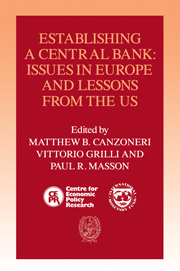Book contents
- Frontmatter
- Contents
- List of figures
- List of tables
- Preface
- List of conference participants
- 1 Introduction
- PART I THE DESIGN OF A CENTRAL BANK
- PART II TRANSITION FROM NATIONAL CENTRAL BANKS TO A EUROPEAN CENTRAL BANK
- PART III FISCAL POLICY REQUIREMENTS OF A COMMON CURRENCY AREA
- 7 Fiscal federalism and optimum currency areas: evidence for Europe from the United States
- 8 Market-based fiscal discipline in monetary unions: evidence from the US municipal bond market
- PART IV GLOBAL IMPLICATIONS OF A EUROPEAN CENTRAL BANK
- Index
8 - Market-based fiscal discipline in monetary unions: evidence from the US municipal bond market
Published online by Cambridge University Press: 05 March 2012
- Frontmatter
- Contents
- List of figures
- List of tables
- Preface
- List of conference participants
- 1 Introduction
- PART I THE DESIGN OF A CENTRAL BANK
- PART II TRANSITION FROM NATIONAL CENTRAL BANKS TO A EUROPEAN CENTRAL BANK
- PART III FISCAL POLICY REQUIREMENTS OF A COMMON CURRENCY AREA
- 7 Fiscal federalism and optimum currency areas: evidence for Europe from the United States
- 8 Market-based fiscal discipline in monetary unions: evidence from the US municipal bond market
- PART IV GLOBAL IMPLICATIONS OF A EUROPEAN CENTRAL BANK
- Index
Summary
Introduction
It is widely accepted that participation in a currency union is inconsistent with independence in the conduct of monetary policy. Indeed, in the ongoing discussions about the path to economic and monetary union (EMU) in Europe, much attention is being devoted both to the establishment of a central monetary authority and to securing a mandate for that institution which would give primacy to the goal of price stability. In this sense, there would appear to be an emerging consensus about how to constrain or ‘discipline’ monetary policy.
Less settled at this stage is what constraints, if any, should be placed on national fiscal policies in a currency union. The debate is influenced by two observations. First, ten years of experience with the European Monetary System (EMS) – during which exchange rate commitments became progressively ‘harder’ – does not suggest that the exchange rate regime itself will be sufficient to force a convergence around sound fiscal policies. In the words of the Delors Report (1989, paragraph 3):
the EMS has not fulfilled its potential.…the lack of sufficient convergence of fiscal policies as reflected in large and persistent budget deficits in certain countries has remained a source of tensions and has put disproportionate burden on monetary policy.
Second, if fiscal policy discipline was not forthcoming in an EMU, then the key objective of the union itself could well be threatened.
- Type
- Chapter
- Information
- Establishing a Central BankIssues in Europe and Lessons from the U.S., pp. 228 - 270Publisher: Cambridge University PressPrint publication year: 1992
- 20
- Cited by



